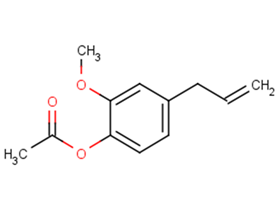
Eugenol acetate
CAS No. 93-28-7
Eugenol acetate( Acetyleugenol | NSC 1242 | NSC1242 | Eugenol Acetate )
Catalog No. M19266 CAS No. 93-28-7
Eugenol Acetate is a constituent of Clove oil, an essential oil from the clove plant, Syzygium aromaticum.
Purity : >98% (HPLC)
 COA
COA
 Datasheet
Datasheet
 HNMR
HNMR
 HPLC
HPLC
 MSDS
MSDS
 Handing Instructions
Handing Instructions
| Size | Price / USD | Stock | Quantity |
| 1G | 27 | In Stock |


|
Biological Information
-
Product NameEugenol acetate
-
NoteResearch use only, not for human use.
-
Brief DescriptionEugenol Acetate is a constituent of Clove oil, an essential oil from the clove plant, Syzygium aromaticum.
-
DescriptionEugenol Acetate is a constituent of Clove oil, an essential oil from the clove plant, Syzygium aromaticum. Clove oil is a natural analgaesic and antiseptic used primarily in dentistry for its main ingredient Eugenol. Clove oil can also be purchased in pharmacies over the counter, as a home remedy for dental pain relief, mainly toothache; it is also often found in the aromatherapy section of health food stores.
-
In Vitro——
-
In Vivo——
-
SynonymsAcetyleugenol | NSC 1242 | NSC1242 | Eugenol Acetate
-
PathwayOthers
-
TargetOther Targets
-
RecptorOthers
-
Research Area——
-
Indication——
Chemical Information
-
CAS Number93-28-7
-
Formula Weight206.24
-
Molecular FormulaC12H14O3
-
Purity>98% (HPLC)
-
SolubilityIn Vitro:?DMSO : 100 mg/mL (484.87 mM)
-
SMILESCC(=O)OC1=C(C=C(C=C1)CC=C)OC
-
Chemical Name4-Allyl-2-methoxyphenyl acetate
Shipping & Storage Information
-
Storage(-20℃)
-
ShippingWith Ice Pack
-
Stability≥ 2 years
Reference
1. Ito, M., eet al.: Food Chem. Toxicol., 43, 461 (2005); Kikuzaki, H., et al.: J. Nat. Prod., 63, 749 (2000).
molnova catalog



related products
-
NAV-2729
NAV-2729 inhibits six ArfGEFs (human ARNO, EFA6, BIG1, and BRAG2 and Legionella and Rickettsia RalF), the strongest effects being against BRAG2, Arf1 and Arf6.
-
Acetophenazine
Acetophenazine is an anxiolytic compound that is used in the study of depression.
-
Ac2-26 TFA (151988-3...
Ac2-26 TFA, an active N-terminal peptide of annexin A1 (AnxA1), attenuates ischemia-reperfusion-induced acute lung injury. Ac2-26 also decreases AnxA1 protein expression, inhibits the activation of NF-κB and MAPK pathways in the injured lung tissue.



 Cart
Cart
 sales@molnova.com
sales@molnova.com


